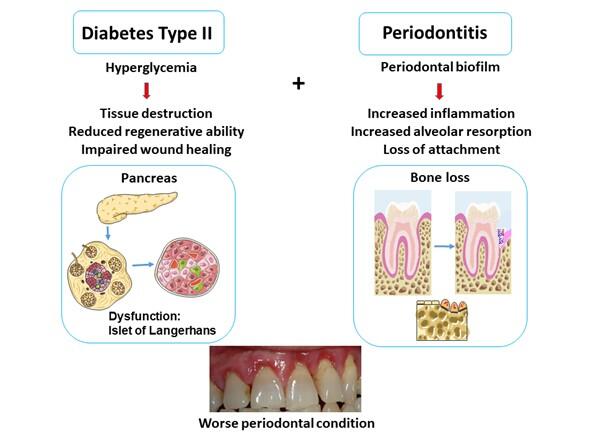Periodontal Research
Periodontitis is a chronic inflammatory disease characterized by progressive destruction of tooth supporting tissues. The disease is initiated and maintained by a polymicrobial dental biofilm and its harmful bacterial products causing an inflammatory reaction in the host. The course of periodontitis depends on several individual characteristics including genetic and environmental factors, first of all smoking.
Main content
Due to the high prevalence, periodontal diseases constitute a public health problem. Periodontitis affects about 45%-50% of adults in its mildest forms, rising to over 60% in people aged >65 years. Severe periodontitis is globally regarded as the sixth most common human disease and affects around 11% of the world's adult population.
The bacterial burden in periodontal diseases results in a systemic inflammatory response which is likely to act as a contributing factor in the pathophysiology of several systemic diseases. A strong connection to diabetes mellitus type 2 has been found, and associations with coronary heart disease, pregnancy complications and pulmonary and autoimmune diseases such as rheumatoid arthritis have been reported.
The research topic “Periodontal diseases” studied by this research group covers various aspects of the disease. A range of different methods have been used by the group members to gain new knowledge about the pathogenesis of periodontitis; molecular basic research, microbial, immunological and clinical studies as well as epidemiological analyses have been applied.
Periodontal pathogens and immunological issues
There is a long tradition in our department and in the former Department of Biochemistry, University of Bergen, for studying periodontal pathogens, with particular emphasis on genetic and outer membrane protein studies of Fusobacterium nucleatum. A highly cited review on F. nucleatum taxonomy came from this group, as well as the first estimate of the genome size of strains of this bacterium. Also, Porphyromonas gingivalis, Aggregatibacter actinomycetemcomitans have been in focus. Later, young people with aggressive periodontitis were analyzed with respect to microbial profiles, immunological factors and pro-inflammatory lipids.
Periodontitis and systemic diseases
Periodontitis in autoimmune and systemic diseases is another focused topic of this research group. An increased risk of periodontitis in rheumatoid arthritis and systemic lupus erythematosus was recently demonstrated in two large nationwide register studies in Norway.
Subgingival microbiome in rheumatoid arthritis patients has been mapped. The relation between chronic inflammatory rheumatic disease and smoking has been investigated. Periodontitis was associated with diabetes mellitus type II and myocardial infarction.
Furthermore, association of periodontitis with other conditions such as pregnancy complications are at present investigated.
We work interdisciplinary with other institutions, departments, and universities, nationally and internationally.
Active Projects:
PTEN hamartoma tumor syndrome and associated oral characteristics
Forekomst av tannkjøttsykdommer hos individer med PTEN hamartom tumor syndrom (PHTS)
Gingival stem cells for bone regeneration
Periodontitis in chronic inflammatory rheumatic disease in Norway
The connection between periodontitis and rheumatoid arthritis: What mechanisms are behind it?
Periodontitis and pregnancy complications: a study based on data from HUNT and MFR
Periodontitis in pregnant women, and early birth. A prospective study.
Periodontitis in cardiovascular disease, diabetes mellitus and chronic inflammatory rheumatic disease
Anti-inflammatory potential of stem cell secretome on periodontal cells in vitro.
Oral health in adults: predictors, social gradients and correlates of cardiovascular health in women and men



